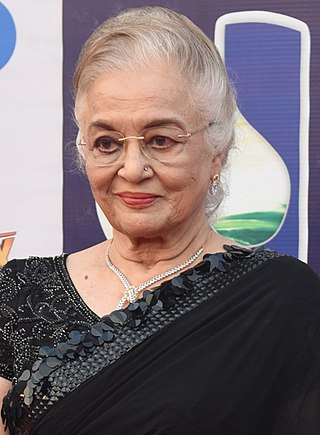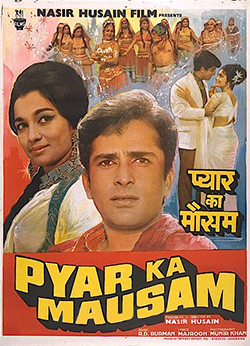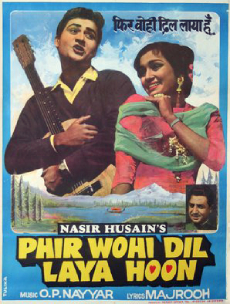
Rahul Dev Burman was an Indian music director and actor, who is considered the greatest and most successful music director of the Hindi Film Music Industry. From the 1960s to the 1990s, Burman composed musical scores for 331 films, bringing a new level of music ensemble with his compositions. Burman did his major work with legendary singers Lata Mangeshkar, Asha Bhosle, and Kishore Kumar. He also worked extensively with lyricist Gulzar, with whom he has some of the most memorable numbers in his career. Nicknamed Pancham, he was the only son of the composer Sachin Dev Burman and Bengali singer-lyricist Meera Dev Burman.

Omkar Prasad Nayyar was an Indian film music composer, singer-songwriter, music producer, and musician. He is considered to be one of the most rhythmic and melodious music directors of the Hindi film industry. He won the 1958 Filmfare Award for Best Music Director for Naya Daur. Nayyar worked extensively with singers Geeta Dutt, Asha Bhosle, Mohammed Rafi, though not with leading Bollywood female singer Lata Mangeshkar.

Asha Parekh is an Indian actress, film director, and producer who worked in Hindi films. Regarded as one of Hindi cinema's finest actresses, Parekh has worked in more than 85 films, in a career spanning over four decades. Parekh has received several accolades including two Filmfare Awards. In 1992, she was honoured with the Padma Shri by the Government of India for her contribution to the field of cinema and was honoured with Dadasaheb Phalke Award in 2020.

Mohammad Nasir Hussain Khan, better known as Nasir Hussain, was an Indian film producer, director, and screenwriter. With a career spanning decades, Hussain has been credited as a major trendsetter in the history of Hindi cinema. For example, he directed Yaadon Ki Baraat (1973), which created the Hindi language masala film genre that defined Hindi cinema in the 1970s and 1980s, and he wrote and produced Qayamat Se Qayamat Tak (1988), which set the Hindi language musical romance template that defined Hindi cinema in the 1990s. Akshay Manwani wrote a book on Hussain's cinema titled Music, Masti, Modernity: The Cinema of Nasir Husain.

Pyar Ka Mausam is a 1969 Indian Hindi-language musical romance film under Nasir Hussain films banner. Its plot has much similarity to Hussain's own earlier film "Tumsa Nahi Dekha," with Ameeta and Shammi Kapoor in the lead roles. It starred Shashi Kapoor, and the Nasir Husain fixture- Asha Parekh. It also had Bharat Bhushan, Nirupa Roy, Madan Puri, Tahir Hussain and another Nasir Husain fixture Rajendranath. Nasir's nephew Faisal Khan who was 3 years old at the time plays Shashi Kapoor's character as a child. Two more Husain fixtures were responsible for the memorable songs: lyricist Majrooh Sultanpuri and music composer R.D. Burman. R.D.Burman also had an acting role in the film. The film became a Silver Jubilee Hit.

Teesri Manzil is a 1966 Indian musical mystery film directed by Vijay Anand and produced by Nasir Hussain. Released on 21 October 1966, the film stars Shammi Kapoor and Asha Parekh in titular roles and Helen, Premnath, Iftekhar and Prem Chopra in supporting roles. With the music and songs setting records, this film became a hit at the box office and is considered among the best offerings and one of the first breakthroughs of R. D. Burman's career.
Rajendra Nath Malhotra was an Indian actor and comedian in Hindi and Punjabi films.

Dil Deke Dekho is a 1959 Indian Hindi romantic comedy film. It was Nasir Hussain's second film as a director after Tumsa Nahin Dekha (1957), which became a big hit and gave star Shammi Kapoor a new image as a comedic, dancing hero. Hussain and Kapoor reteamed with this film. also in this, Asha Parekh, a former child actress, made her film debut as a heroine. This is also music composer Usha Khanna's first film.

Jab Pyar Kisi Se Hota Hai is a 1961 Hindi-language musical comedy film that became a box office hit. It was written, produced, and directed by Nasir Hussain. The first film Hussain ever produced, it featured Dev Anand and Hussain fixture Asha Parekh in the leading roles. Pran played the villain in the film and Rajindernath starred in a supporting role.

Phir Wohi Dil Laya Hoon is a 1963 Indian Hindi-language film. The film became superhit at the box office. This was Nasir Hussain's second production, after the hit film Jab Pyar Kisi Se Hota Hai (1961). He also wrote and directed it. It starred Joy Mukherjee and the Nasir Hussain fixture Asha Parekh. Pran played the villain in the film and Rajindernath had a supporting role. It also contains many songs that Mohammed Rafi sang beautifully.

Zamaane Ko Dikhana Hai is a 1981 Indian Hindi romantic thriller film produced and directed by Nasir Hussain. It stars Rishi Kapoor, Padmini Kolhapure, Yogeeta Bali, Amjad Khan, Kader Khan, Shreeram Lagoo in pivotal roles. The film flopped and Hussain blamed the arrival of video in the early 1980s for the film's failure and that it deserved a better fate.
The 19th Filmfare Awards were held in 1972, honoring the best in Hindi films in the year 1971.
Laxmi Chhaya was an Indian actress, dancer and teacher, who was known for her distinctive character roles and appearances in Hindi films.










